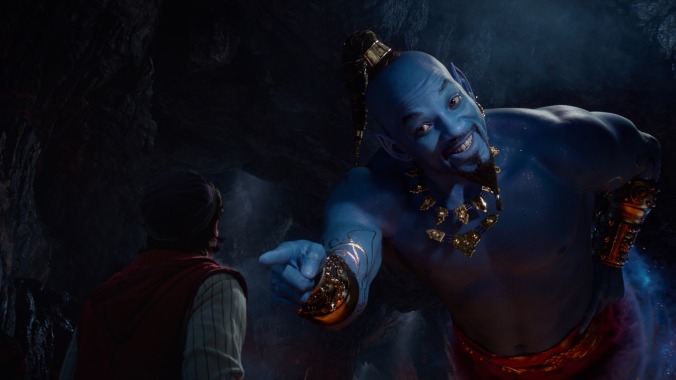The lifeless Disney remake Aladdin can’t muster the original’s magic


The forced march of listless live-action Disney remakes continues with Guy Ritchie’s Aladdin, the worst of a batch that has already gifted us forgettable, over-designed reimaginings of Cinderella and Beauty And The Beast. Of course, Disney’s beloved 1992 animated musical about a young thief and the campy, wish-fulfilling buddy he finds in a magic lamp has always seemed like a bad fit for a flesh-and-blood update. Its zippy charms—from the mile-a-minute celebrity impressions of Robin Williams’ Genie to the scenery changes that accompany Alan Menken, Tim Rice, and Howard Ashman’s brain-spongingly hummable songs—belong to the elastically flat world of cel animation, with an occasional, pioneering digital assist. But the nostalgia-mongers and intellectual-property necromancers of the House Of Mouse have made a business out of ignoring the bog-standard life lessons of their own movies—in this case, the one about how riches and power can’t buy happiness. One might even say that they’ve disregarded one of the Genie’s cardinal rules: You can’t bring anything (not even a half-billion-dollar early ’90s hit) back from the dead. Like the big blue guy himself once said, in his best slimy Peter Lorre voice, “It’s not a pretty picture.”
There’s another all-important rule that comes with the Genie’s three wishes: No amount of magic can make someone fall in love. Williams’ largely ad-libbed vocal performance (not to mention Eric Goldberg’s character animation) remains one of the great successes of Disney’s post-Little Mermaid renaissance period, and no amount of star power and special effects could ever truly fill his pointy shoes. But even taking that into account, the decision to hand the role over to Will Smith seems like titanic miscasting. The erstwhile Fresh Prince is a much more subdued presence (and that’s putting it nicely), though the script still insists on having him repeat many of Williams’ improvised zingers. The popular Broadway stage adaptation of Aladdin managed to get out of his shadow by leaning into the source material’s strengths as a musical, restoring characters and songs that had been cut during the production of the original film. But the new Aladdin—which features the animated version’s half-dozen musical numbers, often with truncated or poorly reworded lyrics, and adds in a misbegotten new song—feels hamstrung by the music. Simply put, Smith isn’t much of a singer, a fact that becomes obvious the moment he starts belting out “Arabian Nights” over the opening credits. (The end credits, on the other hand, get a vintage, movie-summarizing Will Smith rap.)
Apart from a few minor cosmetic changes (none of them for the better), Ritchie’s version follows the plot of the animated film to the letter. In the far-flung Arabian city of Agrabah, the goodhearted pickpocket Aladdin (Mena Massoud) has a chance meeting with the sultan’s daughter, Jasmine (Naomi Scott). She—consigned to a cloistered life on the palace grounds by an overprotective father—has gone out disguised as a handmaiden named Dalia, and he is trying to dodge the guards with the help of his sticky-fingered monkey, Abu. Later, he sneaks into the palace to see her, only to be caught by the sultan’s dastardly, sorcerous vizier, Jafar (Marwan Kenzari). He whisks Aladdin away to the leonine maw of the Cave Of Wonders, revealing Jasmine’s true identity and promising to make Aladdin a prince if he can bring back a certain lamp from the cave’s treasure-filled interior.
The only stipulation is that no one venturing into the Cave Of Wonders is allowed to touch any of the shiny riches contained therein—though, given the circumstances, the only thing more disastrous than striking a deal with a character as obviously evil as Jafar is bringing a kleptomaniac primate along for the job. One thing leads to another, and Aladdin ends up trapped inside with his monkey, a sentient magic carpet, and the lamp, which turns out to be the home of Smith’s Genie, a 10,000-year-old super-dude with glistening, distractingly oversize pecs and biceps who quickly launches into a lifeless rendition of “Friend Like Me.” After tricking the Genie into a free ride out of the cave, Aladdin makes the first of his three wishes: to become a prince so that he can properly compete for Jasmine’s affections with a dimwitted royal suitor (Billy Magnussen) from the far North.
Extending Aladdin’s courtship of the princess is about the closest that the screenplay (credited to Ritchie and frequent Tim Burton collaborator John August) gets to tailoring the material to Smith’s strengths as a star. In human disguise, the Genie ends up acting as a kind of tough-love wingman—think Hitch with magic powers—to the royal impostor “Prince Ali.” But charm, romantic or otherwise, is in short supply in a film that often feels like the creative low point of Ritchie’s post-Sherlock Holmes career as a blockbuster hand. The onetime purveyor of fizzy, dizzyingly over-plotted Brit-crime flicks like Lock, Stock And Two Smoking Barrels and Snatch has never made a movie this anonymous; it lacks the screen chemistry of The Man From U.N.C.L.E., or even the wackadoodle touches of his subsequent franchise non-starter King Arthur: Legend Of The Sword.
Ritchie’s usual knack for flashy pop montage is largely absent. With a running time that’s almost 40 minutes longer than the animated version, thanks to such unnecessary additions as a backstory for Jafar and an honest-to-goodness romantic subplot for the Genie, Ritchie’s Aladdin feels sluggish in comparison to the fast-paced original. Even the songs suffer; the direction of the musical numbers is surprisingly unimaginative and turgid, to the point that even surefire showstoppers like “Prince Ali” and the mighty “A Whole New World” end up succumbing to lackluster staging and uncomfortable performances. (It doesn’t help that Scott, the best singer in this cast, can’t hold a candle to Lea Salonga, who provided Jasmine’s singing voice in the 1992 film.) Of course, if one really wanted to hear awkward and over-emoted interpretations of classic Disney songs, they could save themselves the trouble of buying a movie ticket and just check into the nearest middle-school talent show.